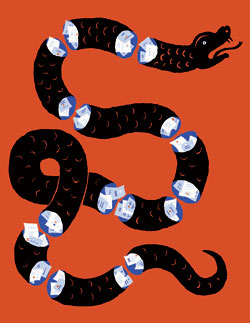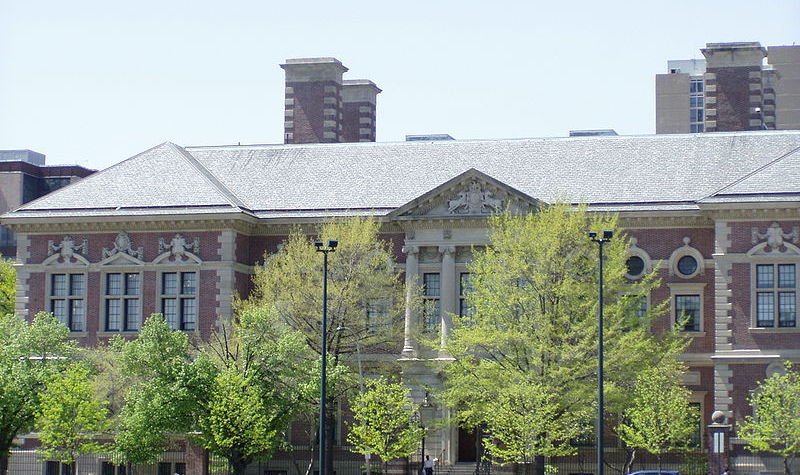Letters: The Sovereign Situation

Illustration by Adam MCCauley
THE SOVEREIGN SITUATION
Regarding “Paper Terrorists,” May: Until you have experienced this leap down the rabbit hole, you may be inclined to laugh this phenomenon off. These “sovereign citizens” cost clients, clerks, witnesses, prosecutors and attorneys thousands of dollars. They are belligerent in these beliefs and, as the article asserts, the movement is growing. In my region, they do recognize the authority of the sheriffs, as distinguished from other distinct law enforcement officers.
The least anguishing part of the process (although certainly time-consuming) is in the court. The attorneys and judges look at each other, muffle the guffaws, listen patiently to the drivel, hogwash and utter nonsense, and finally push the judicial process to a proper conclusion. It is when you discover filings in the chain of title to your home and other property and then have to unwind the mess that the real ramifications sink in.
As a general proposition, you may have civil process and relief, but satisfaction of that relief is often precluded by the genesis that first brought these sovereign citizens into court … the loss of their property by levy or garnishment.
Thomas B. Norris Jr.
Nashville, Tennessee
I’ve represented governments against these gadflies many times. It can in fact be a challenge, and I “get it.” Nonetheless, the author totally misses the point on the reason this is becoming more prevalent. When society as a whole has an increasing sense that its governments are encroaching upon their freedom—and the governments in fact are doing so—statistically, we are going to see an increase in resistance.
Robert Lamb
Cartersville, Georgia
A VC’S-EYE VIEW
I’ve occupied several of the roles described in “They’re After Legal Gold,” May—including big-firm lawyer, in-house lawyer, big-firm client and (corporate) venture capitalist, all in Silicon Valley—and I’m not so sanguine about these developments.
Certainly, big firms especially can bill too much, and there are some tasks like document management and searching that can benefit from IT. But too much emphasis on efficiency doesn’t necessarily bring the best result for the client—or for others in the business ecosystem. This is especially worrisome when it comes to transactions. When I was representing a large, non-U.S. company negotiating with the former employer of one of the VCs mentioned above, a well-known monopolist, the latter company had a very efficient style of negotiation: categorically refuse to accept any of our proposed changes to any of the seven or eight documents involved in the deal. No wonder they can close deals in three days.
To be fair, IT startups like the ones mentioned in this article are probably more of a symptom than a cause of this trend toward bullying in the name of efficiency. But at least when it comes to transactions and business operations in the ordinary course, the willful suppression of the human element and the give-and-take of usual business relationships will make business a lot less fun.
The best parts of being a transactional lawyer and a businessperson in my 30-year career have been the qualitative aspects of the work. It’s very shortsighted to try to trade those away for metrics and automation.
Andrew J. Sutter
Tokyo
RESEARCH’S SHIFTING VISION
Regarding “Vision Quest,” May: The “importance” of legal cases is subjective, relative and shifting—a question for legal and policy arguments. There will, of course, be algorithms that define importance for Ravel’s purposes, but its results would still have to be taken as a jumping-off point in most cases, not an oracle of answers.
Nevertheless, it could be interesting for those trying to shape law if this tool could also be repurposed to consider hypothetical situations. For example, what if certain “important” cases were overruled? How would the visual constellations shift?
The scenario brings a certain practicality to the idea of social engineering. Of course I’m hoping this idea is adopted by progressives and environmentalists, not present and future oligarchs who pretend (if they care that much) that whatever is best for their bottom line is best for the world.
Thomas Marshalek
Bloomington, Indiana
NOT MUCH TO SAY ABOUT THOMAS
Regarding “The Quiet Man,” May: Why the fact that Justice Clarence Thomas fails to contribute to oral argument warrants discussion in the ABA Journal is baffling to me. Nevertheless, I agree with Jeffrey Toobin’s assessment. Further, why should Thomas pay attention when 99.99 percent of the time he just votes with Justice Antonin Scalia? Take the last 6-2 vote: The two were—you guessed it—Scalia and Thomas.
History will judge that he in no way reflects the legal intellect of Justice Thurgood Marshall. In fact, I have no idea where, how or who submitted his name to President George H.W. Bush. I can only surmise that he fulfilled and met all their expectations: That he would not be a Marshall nor make any noticeable mark on the bench.
Vicki Lynn Ward
Cleveland



